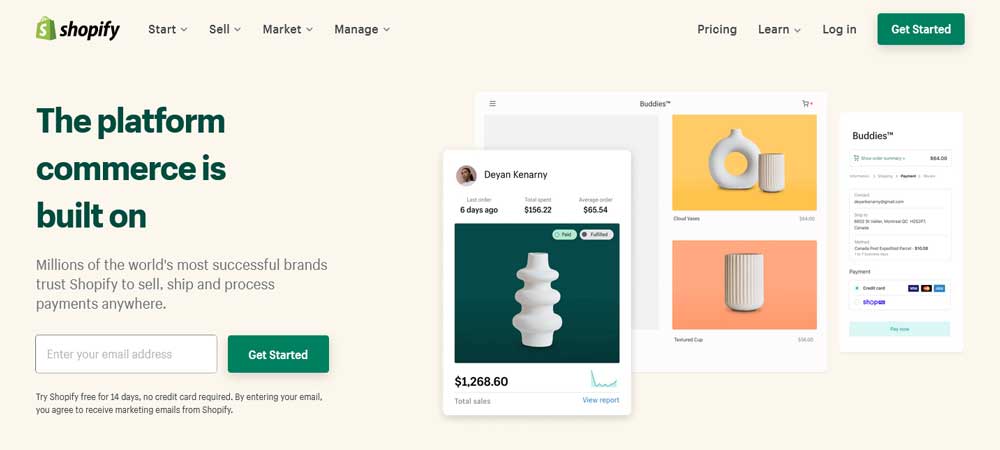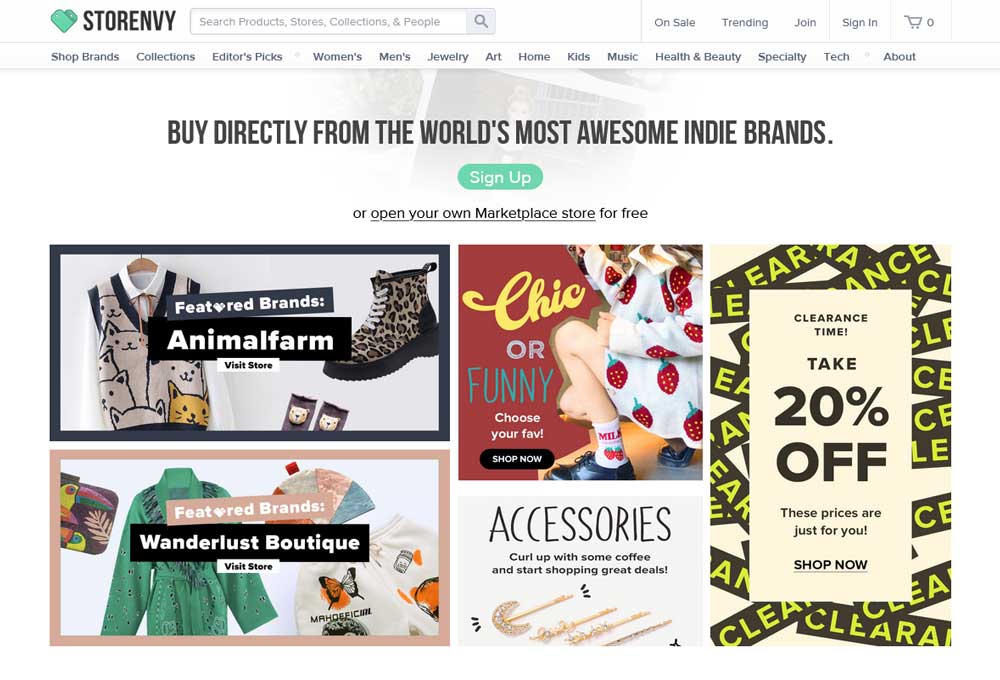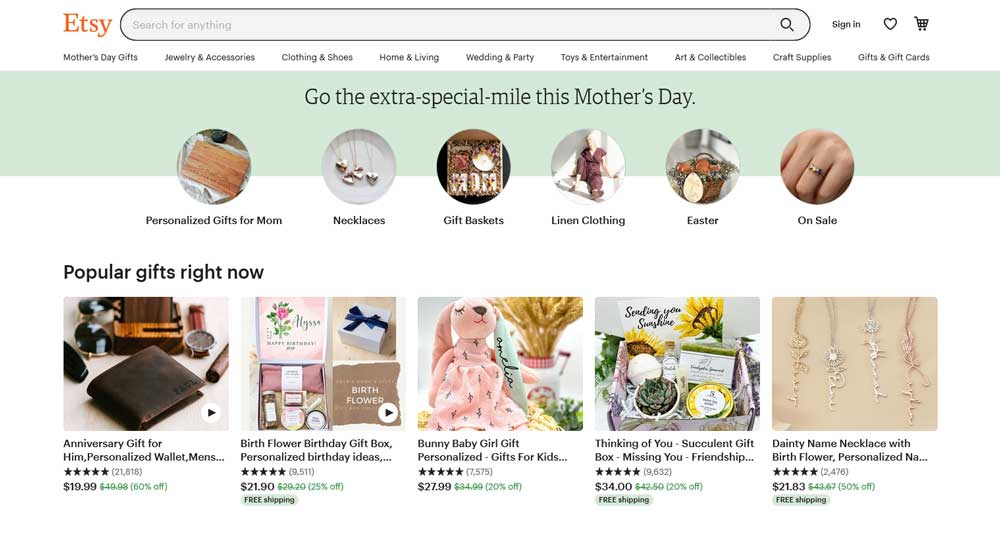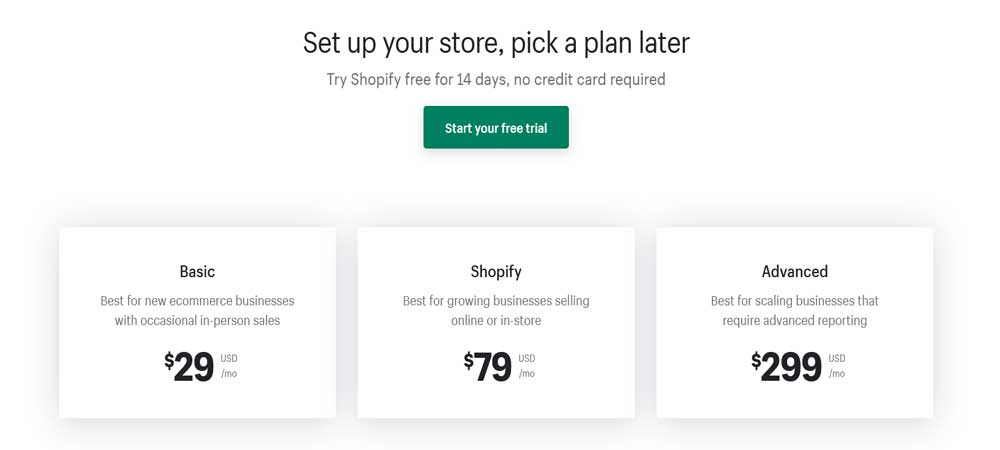Looking for an ecommerce building platform to launch your online store? Here we present a comparison between Storenvy, Etsy and Shopify for those who can’t choose one between these three – yet.
Table of Contents
What’s the main difference between Storenvy, Etsy and Shopify?
Before going in depth for the differences between Storenvy, Etsy and Shopify, let’s have a general idea about each of them:
What’s Storenvy?
The best description for Storenvy would be a “social marketplace,” where sellers could create their marketplace stores to list and display their items. These products might end up in the personalized feeds of buyers who have chosen their favorite brands and styles on their accounts.
What’s Etsy?
Similar to Storenvy, on Etsy, users could list and sell their items after signing up for an account on Etsy. There, sellers work alongside each other, competing to be seen in front of an online audience of Etsy marketplace buyers.
It’s important to note that on Etsy, sellers could only sell certain products such as craft, vintage or handmade goods.
What’s Shopify?
Shopify, on the other hand, is suitable for users who want to start and grow their online shop. That’s because it comes with a huge selection of powerful online selling apps and tools designed to help users achieve their ecommerce goals.
As more than just an online store builder, Shopify allows you to track buyer orders, upload products, and customize your ecommerce site.

Now, let’s see more details on how each of these ecommerce store services compare in different aspects of an online store.
Storenvy vs Etsy vs Shopify: Ease of Use
One of the most key factors in deciding among several options like the platforms for online selling we have here is the ease of use.
Many people give a heavy weight to this factor, because at the end of the day, you’re going to choose a service and most likely be using it on a daily basis. So, why try an ecommerce platform with bad design or difficult interface?
Storenvy ease of use
Based on many reviews across the web, one of the easiest platforms for listing products for sale is Storenvy. To use it, you’d need minimum technical and design experience.
Storenvy dashboard, which is browser based, is your main command center for this online marketplace, making you able to manage operations of your store including storefront design, products listings, marketing, customer orders, etc.
You could also use the intuitive website builder of Storenvy for little HTML and CSS tweaks.
Bear in mind that many users might realize that it’s a little bit complicated to set up the store at the beginning. But, this might improve over time.
Etsy ease of use
In terms of ease of use, Etsy is another great platform to use. That’s because most features aren’t that complex, and the sellers’ dashboard’s intuitive and simple design could hardly give users any headache.
Also, from the time you create an account with Etsy to when your online store is ready to sell to your customers could be so much quick. So, no initial difficulties like the ones at Storenvy.
Shopify ease of use
This platform makes it very easy for users to do any task regarding their online store from launching their shop for the first time to adding their first product to the store to customizing the design of their ecommerce business.
Although Shopify provides so many features for their users in order to have full control over their online ecommerce presence, it’s has managed to keep its beginner-friendly feature at a fair level.
Ease of use verdict
So, considering that Shopify gives you more overall in terms of features and options for your store while keeping the process simple and intuitive at the same time, our choice would be Shopify for this part.

But if you’re satisfied with less feature and speed is more important for you then go for Etsy.
Storenvy vs Etsy vs Shopify: Design
Having an online store with lots of features but terrible or weak design could work as a huge disadvantage for your business among your competition. That’s because first impression is so important that many visitors might leave an unattractive website just moments after entering such store.
Now, that we better understand the importance of design of an online store, let’s see how this factor compares among our ecommerce solutions.
Storenvy design
Although Storenvy gives you a CSS & HTML editor along with its website builder, if you’re not a professional coder you might find it difficult to make needed adjustments to your store. In other words, for the majority of users which aren’t so technical, this platform comes with limited design flexibility.

Changing the main theme (some aren’t free), some of the store layout parts, background images, banners, text, and color are among the main things you could do using the Storenvy website builder.
Etsy design
With Etsy, sellers have even less design control for their stores. That’s why most Etsy stores look the same. The reason is only a very limited design customization is allowed using the Etsy platform.
Some of the adjustments that you could make to your store include changing your store photo styles, fonts and colors.
It could also be told that, your products are almost your only actual tool with Etsy which could separate you from all other sellers on the marketplace.
Shopify design
Just from the moment you’re building your online store with Shopify, you’ll be offered lots of great themes, with different design layouts and visual elements. No matter what industry your business belongs to, from fashion and clothing to furniture and technology, you’d most likely find a few of those Shopify themes attracting for your store design.
These aren’t all free themes, but you could switch them any time you wish. Also, all of them are mobile-friendly (i.e. looking great in mobile devices as well), with modern and professional design layouts.
And that’s not the end of it. After choosing any of these designs, you could further edit and personalize these themes according to your needs and your business goals.
Design verdict
If your main purpose for your online store design is to stand out from your competition then you have little chance with Storenvy and almost no chance with Etsy.
Shopify, with so many themes to choose from and powerful customization options, would give you so many useful tools to make your design something you desire, or at least very close to it. Along the way, it is also possible to make a solid and unique brand for your business as well.
Storenvy vs Etsy vs Shopify: Security
Online platforms, especially those dealing with sensitive data such as customers’ credit card numbers, personal info, etc. should take security really seriously. For instance, defending against online hackers is one of the most critical factors in this matter which many well-known services and platforms across the web understand significantly.
Storenvy security
Having security experts on their team, Storenvy has dedicated lots of energy to the security of their social marketplace platform.
They cover lots of potential issues including malicious hacking penetrations, fraud login attempts, weak and vulnerable online forms, and so on.
So, when using Storenvy, users could be sure that their online presense on this platform along with their personal information are kept securely with this company.
Etsy security
You’d think that a company like Etsy which provides ecommerce services to millions of buyers and sellers each day must be doing something right in the security area as well. Don’t worry, you’re right.
In fact, there are very few security issues with Etsy, which means regarding industry standards the website is very safe to use.
Also, like most online platforms and big companies, it has implemented measures to help users report any security issues so that they could resolve it as soon as possible.
Of course, scammers could be present anywhere, and Etsy, as well as similar platforms, are no exception.
Therefore, part of keeping the selling experience safe and secure on the platform is sellers’ responsibility. This could be done by simple but important actions such as enabling two-factor authentication and changing password regularly.
Also, reporting any fraudulent activities in the account should be reported immediately to prevent further breaches/damages to your personal or financial data.
Shopify security
To ensure the online shoppers’ trust and help keep the revenue stream of the sellers continuous, Shopify has invested a huge amount of money and time to make sure that its ecommerce solutions are compliant with the highest security standards available.
They do this by frequently testing and monitoring their network security, implementing strong anti-breach measures, protecting their customers data, and more which overall contribute to maintaining an ecommerce store builder coming with lots of useful options and features including strong shopping security.
Taking use of SSL certificates for online stores, fraud protection measures, secure admin accounts, and secure payment solutions are among the security benefits which Shopify could have for your online store.
Security verdict
In terms of security, there isn’t much difference when you compare Storenvy vs Etsy, Etsy vs Shopify, or Storenvy vs Shopify since you could be sure that all of them are safe to work with as a retailer or merchant.

In other words, no matter it’s your customers data, your personal information as a seller, or how your store processes credit cards and payments for your buyers, you could be sure that when it comes to making an online shopping experience safe and secure, Shopify, Storenvy or Etsy could satisfy your needs.
Storenvy vs Etsy vs Shopify: Help & Support
For most users, which aren’t so advanced in terms of coding and other technical stuff, getting needed support in the minimum time and through a convenient method is one of the significant factors which could impact their decision a lot.
If for any reason, somethings goes wrong in your online store account and you don’t know the solution, you’d like to be sure that there is someone to help you resolve your issue.
Storenvy support
The only ways you could get support or help on Storenvy is through contact form or email. Add to that the fact that you might need up to 24 hours before some responds to your problem.
As you could see, one of the greatest disadvantages of using Storenvy is their support which also lack more helpful options such as live-chat or phone call assistance.
And unfortunately, you couldn’t find better support packages on any of their plans either.
Etsy support
Etsy services for online sellers come with better support packages. That’s true for users of Etsy’s free plan too.
Phone and live-chat service are available to help Etsy merchants for possible issues. In addition, you could get access to detailed training materials and huge seller communities on the web.
Getting help in Etsy is as easy as clicking on the special menu in your dashboard.
Moreover, there are tons of leaning tools and materials on the site to guide sellers through their ecommerce journey, as well as a reliable and active communities and forums for Etsy on websites like Reddit, Quora and so on.
Shopify support
Almost everything mentioned earlier about Etsy support services are true for Shopify as well, along with extra options and methods to extend the help for more convenience and cover.
So, in addition to Shopify’s 24/7 phone & live chat assistance, retailers could also get technical help through other methods such as video tutorials, email, forum, and social media.
Even better, on some of the Shopify plans, users are provided more dedicated help as advanced specialist support.
Help & support verdict
If you’re serious about this item, like so many other fellow resellers, then don’t even think about Storenvy which lacks a great deal of options in this part.

Both Etsy and Shopify provide great support service, although when you work with Shopify you could be more sure of a dedicated support and in-depth help through a wide range of guides, articles, video tutorials and live person assistance.
Storenvy vs Etsy vs Shopify: Pricing
Here we explore different plans on each service to see how you could get best value for your money on each platform.
Storenvy pricing
Much like many other popular platforms, Storenvy comes with free plan as well. But, the instant disadvantage of this plan is that it provides minimum options for sellers.
You’re limited to just 20 products at most, while having access to the marketplace, and being able to customize your storefront. And that’s it.
Other features such as email services, super discounts, free custom domain and storefront ads removal are presented in the next plan, which is “Artisan Plan.” This would cost you $9.99 per month, making you able to add up to a hundred of your products to your online store at Storenvy.
The two other plans are “Growth” ($24.99) and “Professional” ($49.99) plans with the main difference being the number of products which could be added to the shop: 500 and 5000 respectively.
Another extra option in these higher is more super discounts for your customers.
Etsy pricing
There are two main pricing plans on Etsy: Standard and Plus.
On the Standard plan merchants aren’t charged any monthly fees. Instead, there are other costs involved such as the fees for payment processing, transaction charges and listing fees.

The Standard plan is suitable for most sellers and they could do their routine tasks with it without any problem.
However, for those looking to get more features on the ecommerce platform and get ahead from the competition, Etsy Plus might be a better solution.
Etsy Plus which costs a monthly charge of $10 provides extra features such as advanced store customization, restock requests, discounts for custom web address, and credits for Etsy Ads and shop listings.
Shopify pricing
Shopify is one of the great example of services which you’ll get features and functionalities according to your subscription payment. Although in terms of upfront costs it seems that you’ll be charged more on Shopify, but when you see the list of features on each plan you’ll realize how valuable these are:
Basic Shopify, which only costs $29 per month, comes with standard rates for credit card processing, POS App, fraud analysis, abandoned cart recovery, free SSL certificate, discount codes, manual order creation, multichannel selling, 24/7 support, unlimited products and more.
On the Shopify plan (yes, that’s actually the name of one of the subscription packages on the Shopify platform) you’ll get lower fees for credit card processing, professional reports, gift cards and so on, in addition to the features already on the Basic plan. And all for a $79 monthly plan.
As you could see the list goes on and on for additional options and features on each Shopify plan.
And there is an Advanced Shopify plan ($299) with even more useful feature for more professional sellers and retailers.
But the fact is for most users who want to set up their store and add their products or import some products (from their stores somewhere else or from their suppliers as a dropshipper) or add their own items to their online store, the basic plan might be more than enough, at least for the start.

So, it might be a good idea to begin your online selling journey with Shopify by signing up for its lowest plan and then upgrade it as needed as you progress more in your business or when you’d like to scale.
Besides, there is a Shopify Lite plan which is more suitable for those not wanting an independent online store but just the ability to sell some items through other places like blogs or websites.
Of course, credit card payments could be accepted to make the selling possible. The pricing for the Lite plan is just $9/month.
On the other hand, for supper sellers and those merchants with high volume selling, there is Shopify Plus which could help them with their huge businesses by offering more ecommerce solutions and tools.
Pricing verdict
It’s one of those places which judging only by numbers might get you in trouble.
That’s because the cheapest of the ecommerce services here is Storenvy which comes with a free plan, but compared to Etsy or Shopify, gives you far less capabilities in terms of ecommerce tools and options.
On the other hand, the next cheapest is naturally Etsy. But again, Etsy too, in comparison with Shopify might not be so powerful since there are more features on Shopify which Etsy lacks.
So the better method here might be through comparing each value/cost, which then shows you the winner more clearly: Shopify, of course.
Conclusion
Although Shopify, Etsy and Storenvy might look similar when you first think about them, but that fact is that these online selling platforms are very different, each of them most suitable for a varied type of merchant and goal.
For those just wanting to try their skills or have an online selling experience as a fun project or a not-so-serious side hustle, Storenvy might be good idea, especially with its free plan which lets you try some limited options and products to sell.
The same goes for Etsy, particularly for those retailers who want to access the marketplace of millions of buyers shopping on Etsy for craft supplies, vintage products or handmade goods.
However, no matter which category of sellers you belong to, we still recommend you to use Shopify with its free trial period which allows you to try lot more features without any obligation to continue the Shopify account subscription.
